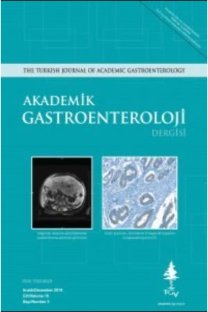Anti-pankreatik antikor, anti-nötrofil sitoplazmik antikor ve anti- Saccharomyces cerevisiae antikorlarının inflamatuvar barsak hastalıklarındaki tanısal değeri ve hastalık aktivitesi ile ilişkilerinin değerlendirilmesi
Evaluation of diagnostic values of anti-pancreatic antibody, anti-neutrophil cytoplasmic antibody (p-ANCA) and anti-Saccharomyces cerevisiae antibody (ASCA) in inflammatory bowel disease and their association with disease activity
___
- 1. Frolkis A, Dieleman LA, Barkema H, et al. Environment and the in - flammatory bowel diseases. Can J Gastroenterol 2013; 27: e18-24.
- 2. Jung SA. Differential diagnosis of inflammatory bowel disease: what is the role of colonoscopy? Clin Endosc 2012; 45: 254-62.
- 3. Papadakis KA, Tabibzadeh S. Diagnosis and misdiagnosis of inflam - matory bowel disease. Gastrointest Endosc Clin N Am 2002; 12: 433-49.
- 4. Kuna AT. Serological markers of inflammatory bowel disease. Bio - chem Med (Zagreb) 2013; 23: 28-42.
- 5. Shanahan F. Antibody markers in Crohns disease: opportunity or overstatement? Gut 1997; 40; 557-8.
- 6. Vernier G, Sendid B, Poulain D, Colombel JF. Relevance of serologic studies in inflammatory bowel disease. Curr Gastroenterol Rep 2004;6: 482-7.
- 7. Dotan I. New serologic markers for inflammatory bowel disease diagnosis. Dig Dis 2010; 28: 418-23.
- 8. Homsak E, Micetic-Turk D, Bozic B. Autoantibodies p-ANCA, GAB and PAB in inflammatory bowel disease: prevalence, characteristics and diagnostic value. Wien Klin Wochenschr 2010; 122(Suppl 2): 19-25.
- 9. Seibold F, Weber P, Jenss H, Wiedmann KH. Antibodies to a trypsin sensitive pancreatic antigen in chronic inflammatory bowel disease: specific markers for a subgroup of patients with Crohns disease. Gut 1991; 32: 1192-7.
- 10. Goischke EM, Zilly W. Clinical importance of organ-specific antibod - ies in ulcerative colitis and Crohn disease. Z Gastroenterol 1992; 30: 319-24.
- 11. Muller-Ladner U, Scholmerich J. Pancreatic autoantibodies in Crohns disease. Eur J Clin Invest 1999; 29: 46-7.
- 12. Koutroubakis I, Drygiannakis D, Karmiris K, et al. Pancreatic auto - antibodies in Greek patients with inflammatory bowel disease. Dig Dis Sci 2005; 50: 2330-4.
- 13. Joossens S, Vermeire S, Van Steen K, et al. Pancreatic autoantibod - ies in inflammatory bowel disease. Inflamm Bowel Dis 2004; 10: 771-7.
- 14. Demirsoy H, Ozdil K, Ersoy O, et al. Anti-pancreatic antibody in Turkish patients with inflammatory bowel disease and first-degree relatives. World J Gastroenterol 2010 ; 16: 5732-8.
- 15. Kılıç MY, Tunç B, Ayaz S, et al. Antineutrophil cytoplasmic autoanti - bodies and Antisaccharomyces cerevesia autoantibodies in inflam- matory bowel disease. Turk J Gastroenterol 2004; 15: 238-42.
- 16. Quinton JF, Sendid B, Reumaux D, et al. Anti-Saccharomyces cerevi - siae mannan antibodies combined with antineutrophil cytoplasmic autoantibodies in inflammatory bowel disease: prevalence and di - agnostic role. Gut 1998; 42: 788-91.
- 17. Lawrance IC, Hall A, Leong R, et al. A comparative study of goblet cell and pancreatic exocine autoantibodies combined with ASCA and p-ANCA in Chinese and Caucasian patients with IBD. Inflamm Bowel Dis 2005; 11: 890-7.
- 18. Zhou F, Xia B, Wang F, et al. The prevalence and diagnostic value of perinuclear antineutrophil cytoplasmic antibodies and anti-Saccha - romyces cerevisiae antibodies in patients with inflammatory bowel disease in mainland China. Clin Chim Acta 2010; 411: 1461-5.
- 19. Peeters M, Joossens S, Vermeire S, et al. Diagnostic value of anti- Saccharomyces cerevisiae and antineutrophil cytoplasmic autoanti - bodies in inflammatory bowel disease. Am J Gastroenterol 2001; 96: 730-4.
- 20. Zhang Z, Li C, Zhao X, et al. Anti-Saccharomyces cerevisiae antibod - ies associate with phenotypes and higher risk for surgery in Crohns disease: a meta-analysis. Dig Dis Sci 2012; 57: 2944-54.
- 21. Singh S, Sharma PK, Loftus EV Jr, Pardi DS. Meta-analysis: serologi - cal markers and the risk of acute and chronic pouchitis. Aliment Pharmacol Ther 2013; 37: 867-75.
- 22. Lombardi G, Annese V, Piepoli A, et al. Antineutrophil cytoplasmic antibodies in inflammatory bowel disease: clinical role and review of the literature. Dis Colon Rectum 2000; 43: 999-1007.
- 23. Castillo S, Ramaiah B, Blum S, Remy P. The value of serologic mark - ers in indeterminate colitis: a prospective follow-up study. Gastro - enterology 2003; 125: 999-1000.
- ISSN: 1303-6629
- Yayın Aralığı: Yılda 3 Sayı
- Başlangıç: 2002
- Yayıncı: Jülide Gülay Özler
Karaciğer nakli sonrası mikofenolat mofetile bağlı kolit: Olgu sunumu
Serkan YARAŞ, Bünyamin SARITAŞ, Fehmi ATEŞ, Engin ALTINTAŞ, Ebru SERİNSÖZ, Orhan SEZGİN, Zeynep Ebru ESER
Nadir bir demir eksikliği anemisi sebebi: Duodenal divertikül
Fatih ERMİŞ, Murat ERDOĞAN, Ali KUTLUCAN, Fahri Halit BEŞİR, Yusuf AYDIN
Nezih Pişkinpaşa -, Yaşar Sertbaş -, Emin PİŞKİNPAŞA
Retrorektal dermoid kist: Olgu sunumu
Cem ÇEKİÇ, Zeynep Zehra GÜMÜŞ, Serkan İPEK, Sinan AKAY, Emrah ALPER, Cemil ÇALIŞKAN, Belkıs ÜNSAL
Erhan TATAR, Cem ÇEKİÇ, Serkan İPEK, Sezgin VATANSEVER, Serdal DEMİR, Firdevs TOPAL, Dilek SOYSAL ERSİL, Belkıs ÜNSAL
Hepatit B hastalarında nötrofil/lenfosit oranı ile fibrosis arasındaki ilişki
Atakan YEŞİL, SÜLEYMAN COŞGUN, Emrullah ERDEM, Koray KOÇHAN, Feyza GÜNDÜZ, Can GÖNEN
Retrorektal dermoid kist: Olgu sunum
Cem ÇEKİÇ, Zeynep Zehra GÜMÜŞ, Serkan İPEK, Sinan AKAY, Emrah ALPER, Cemil Çalişkan -, Belkıs Ünsal -
İnek sütü proteini allerjisinden kaynaklanan hemorajik gastrit
Eylem SEVİNÇ, Duran ARSLAN, Haluk AKAR
Eyüp ŞENOL, Fahrettin KÜÇÜKAY, Melih EREREN, Rıza S. ÖKTEN, Muharrem TOLA
